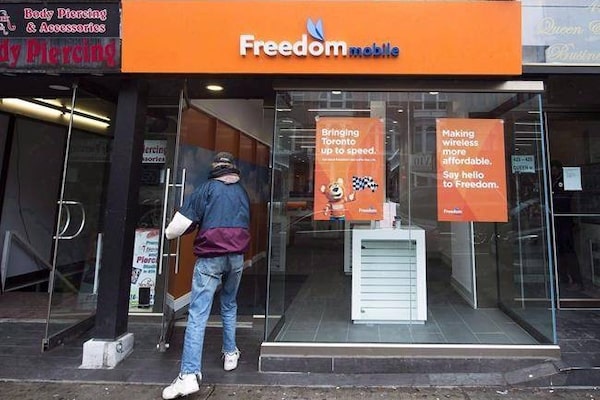
A man enters a Freedom Mobile store in Toronto on Nov. 24, 2016.Nathan Denette/The Canadian Press
Executives at Shaw Communications Inc. say they expect strong growth at their wireless business to continue this year even as the global smartphone market shows signs of a slowdown.
The Calgary-based company reported another quarter of strong numbers for its Freedom Mobile business Monday, with 86,000 new contract customers, more than double the 33,000 it attracted in the same period a year earlier and well above analyst estimates in the range of 55,000.
But chief executive Brad Shaw told analysts during a conference call for the company’s fiscal first-quarter results that while “sales activity remained strong throughout the holidays ... I would characterize the overall wireless environment as being less active than a year ago."
Paul McAleese, president of wireless at Shaw, agreed that the holiday season was “somewhat measured and somewhat quieter” than the previous year, and pointed to a “flattening out of smartphone replacement cycles,” saying that could affect Freedom Mobile’s numbers this year.
Sales of Apple Inc.'s iconic iPhone, for example, have plateaued as each new iteration of the device gets more expensive while the basic functionality doesn’t change dramatically.
Nonetheless, Mr. McAleese said he expects Freedom to continue to win subscribers away from its national rivals as it uses large monthly data plans to target customer irritants such as expensive charges for going over data limits.
“We’re going to continue to poke at that. We believe that that’s an aspect of the competitive environment that we just find unconscionable,” he said of the fees charged by Rogers Communications Inc., BCE Inc. and Telus Corp.
Shaw has been upgrading its network by activating new cellular airwaves and signing agreements with new retail outlets to sell Freedom Mobile products and service. The company, which operates in Ontario, British Columbia and Alberta, is also expanding its wireless service area in Western Canada to cover more mid-size cities, aiming to reach an additional one million customers. It plans to launch in Victoria and Red Deer, Alta., within the next few weeks.
Overall profit at Shaw spiked in the first quarter owing to its strong wireless results and the use of cost cutting to protect profit margins at its legacy cable business, which has been bleeding television customers.
Net income increased by 68.5 per cent in the quarter to $187-million, which Shaw said was because of revenue growth at the wireless business as well as lower employee costs at the cable division following a voluntary buyout program that has seen 1,500 workers depart since last March.
Overall revenue was up 8.8 per cent at $1.36-billion, while operating income before restructuring costs and amortization grew by 13.5 per cent to $545-million, both beating analyst forecasts. Shaw earned 36 cents a share in the period, up from 22 cents a year earlier.
Shaw’s wireless business still accounts for a small portion of the company’s operating income, but it is growing at a fast pace; at $45-million in the first quarter, it was up 36.4 per cent.
Shaw, which acquired Freedom Mobile (previously known as Wind Mobile) in 2017, disclosed the rate of subscriber turnover among contract wireless customers for the first time this quarter, reporting churn of 1.28 per cent a month, which it said was down from 1.64 per cent a year earlier.
That improvement suggests Freedom is making some progress to catch up to the large national carriers, which have superior networks and broader coverage. Telus consistently posts the lowest rate of churn, with 0.87 per cent last quarter, while Rogers and BCE reported turnover of 1.09 per cent and 1.14 per cent, respectively.
Freedom Mobile also reported growth in monthly revenue, with average billing per user (ABPU) up 12 per cent to $41.99. The company said that was owing to more subscribers signing up for more expensive data plans as well as purchasing smartphones directly through the carrier.
Freedom’s double-digit ABPU growth comes as the Big Three face slowing or stagnant growth on that front, which they have attributed to aggressive promos leading to larger monthly data allowances and fewer overage charges.
For Shaw’s wired services, it lost 24,000 cable and 28,000 satellite TV customers. It also shed 7,300 telephone subscribers while adding about 6,900 internet customers. Those numbers were roughly in line with analyst expectations.
Desjardins Securities analyst Maher Yaghi noted that despite the subscriber declines, revenue for Shaw’s landline services was flat year-over-year as gains on internet sales offset losses for television.
“We believe this is an important point to appreciate because so long as Shaw can maintain or slightly grow revenue in wireline, the growth in wireless should combine to provide a strong platform for long-term investor returns,” he said.